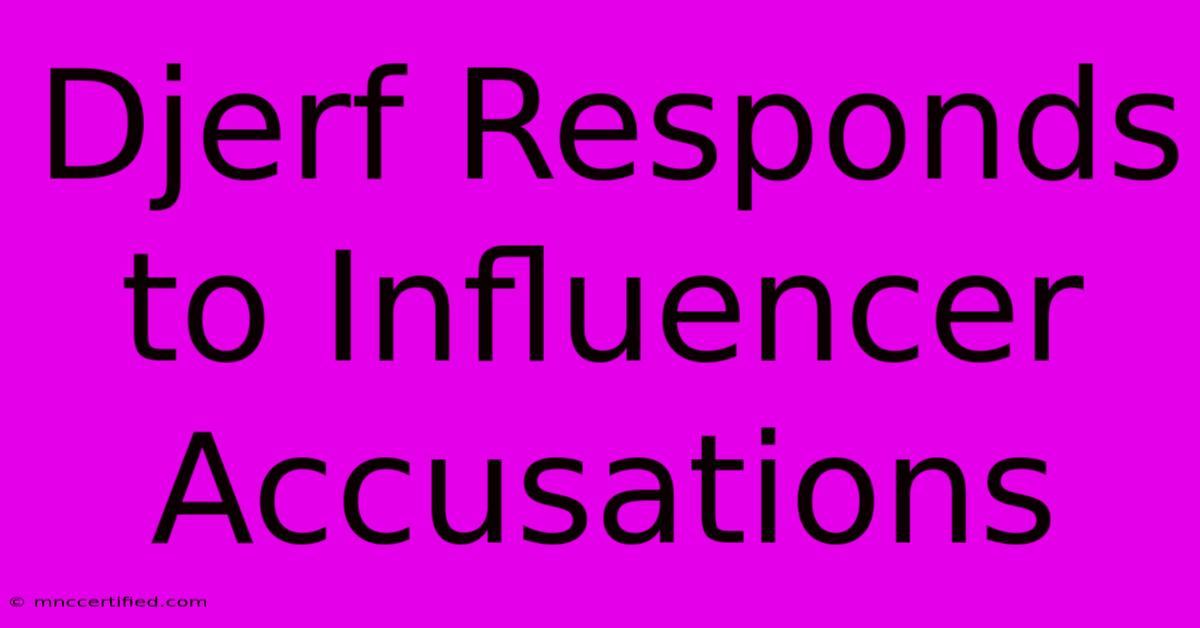Djerf Responds To Influencer Accusations

Table of Contents
Djerf Responds to Influencer Accusations: Addressing the Controversy
The influencer world is rarely without drama, and recently, prominent influencer, Djerf, found themselves at the center of a heated controversy. Accusations have flown, sparking intense debate across social media and raising questions about transparency, ethics, and the realities of online influence. This article delves into the situation, examining the accusations leveled against Djerf and their subsequent response. We'll analyze the impact of this controversy on their brand and the wider influencer landscape.
The Accusations: A Breakdown
The accusations against Djerf are multifaceted, ranging from allegations of misleading advertising to concerns about authenticity and brand partnerships. Specific claims include:
- Inflated engagement metrics: Some critics allege that Djerf's engagement numbers are artificially boosted, questioning the organic reach of their content. This is a common accusation in the influencer world, where purchased followers and likes can inflate a perceived level of success.
- Lack of transparency in sponsored content: Concerns have been raised about a lack of clear disclosure in sponsored posts, potentially violating advertising regulations and misleading followers. The line between organic content and paid promotion can be blurry, and accusations of deceptive practices are damaging to an influencer's credibility.
- Negative experiences with brands: Anecdotal evidence suggests some brands have had negative experiences collaborating with Djerf, citing issues with professionalism and communication. These reports, while unverified, contribute to the overall negative perception.
It's crucial to remember that these accusations are currently allegations and haven't been definitively proven. However, the impact of these claims on Djerf's reputation is undeniable.
Djerf's Response: Damage Control or Genuine Apology?
Djerf has responded to these accusations via [Platform where the response was issued - e.g., Instagram, YouTube, blog post]. Their response [summarize the key points of their response. Did they deny the accusations? Offer an apology? Explain their actions?].
Analyzing their response, several key elements stand out:
- Acknowledgement of mistakes: Did Djerf acknowledge any wrongdoing? A genuine apology, demonstrating a willingness to learn and improve, can go a long way in rebuilding trust.
- Transparency and accountability: Did the response offer concrete steps towards greater transparency in future collaborations? This includes clearly disclosing sponsored content and addressing concerns about engagement metrics.
- Commitment to change: Did Djerf commit to implementing changes in their practices? This could involve adopting stricter guidelines for sponsored content, improving communication with brands, or investing in more ethical and sustainable practices.
The Impact on the Influencer Landscape
This controversy highlights crucial issues within the influencer marketing industry:
- The need for greater transparency: The incident underscores the urgent need for increased transparency in sponsored content. Clearer guidelines and stricter regulations are necessary to protect consumers from misleading advertising.
- The importance of authenticity: Consumers are increasingly discerning, valuing authenticity and genuine connection over artificial engagement. Influencers must prioritize building trust with their audience through honest and transparent content.
- The ethical considerations of influencer marketing: This situation raises ethical questions regarding the responsibilities of influencers and the impact of their actions on their audience. A focus on ethical practices and sustainable growth is vital for the long-term health of the industry.
Conclusion: Learning from the Controversy
The Djerf controversy serves as a cautionary tale for all influencers. Maintaining transparency, prioritizing authenticity, and upholding ethical standards are essential for building a sustainable and reputable online presence. The long-term success of any influencer hinges on trust and genuine connection with their audience. This incident provides a valuable lesson for both established and aspiring influencers, highlighting the importance of responsible and ethical conduct in the digital world. It also highlights the power of social media in holding influencers accountable for their actions. The future of influencer marketing will likely depend on a greater emphasis on accountability, transparency, and ethical considerations.
Keywords: Djerf, influencer, accusations, controversy, misleading advertising, transparency, authenticity, brand partnerships, sponsored content, social media, influencer marketing, ethics, accountability, damage control, response, online reputation.

Thank you for visiting our website wich cover about Djerf Responds To Influencer Accusations. We hope the information provided has been useful to you. Feel free to contact us if you have any questions or need further assistance. See you next time and dont miss to bookmark.
Featured Posts
-
Fender Cancels Shows Glasgow Newcastle
Dec 18, 2024
-
Plane Crash Near Honolulu 2 Killed
Dec 18, 2024
-
Isle Of Man Stamps Feature Cavendish
Dec 18, 2024
-
Adverse Finding For Mudryk Premier League News
Dec 18, 2024
-
Rockford University Expands Masters Degrees
Dec 18, 2024